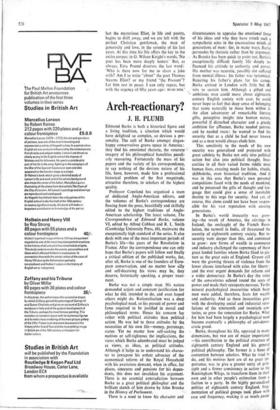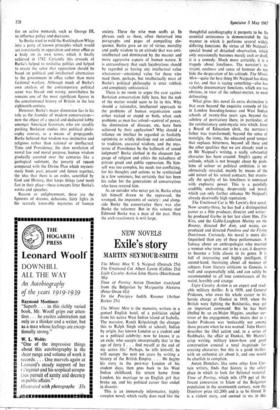Arch-reactionary?
J. H. PLUMB
Edmund Burke is both a historical figure and a living tradition, a situation which would have delighted so complex, so devious a per- sonality. The cult of Burke amongst slogan- happy conservatives grows apace in America : they find his emotional rhetoric, the concrete imagery of his philosophical banalities peculi- arly reassuring. Fortunately the mass of his papers and the variety of his correspondence, to say nothing of the devious nature of his life, have, however, made him a professional historical problem of the first magnitude, attractive therefore, to scholars of the highest quality.
Professor Copeland has organised a team of dedicated Anglo-American editors, and the volumes of Burke's correspondence are flowing from the press, beautifully and skilfully edited to the highest traditions of Anglo- American scholarship. The latest volume, The Correspondence of Edmund Burke, volume VI, edited by Alfred Cobban and R. L. Smith (Cambridge University Press, £6), maintains the exceptionally high standard of the series. It also deals with one of the most important periods of Burke's life—the years of the Revolution in France. After the correspondence one can only hope that Burke's papers will follow and finally a critical edition of the published works, for, after all, Burke is one of the founders of Euro- pean conservatism, and no matter how silly and self-deceiving his views may be, they deserve, historically speaking, a proper treat- ment.
Burke was not a simple man: His nature demanded action and constant justification for what he did, intended to do, and even hoped others might do. Rationalisation was a deep psychological need, so his pursuit of power and fame required to be justified in moral and philosophical terms. Hence his concern lay rather with political attitudes than political action. He was led to those attitudes by the necessities of his own life—money, _patronage, status. Yet no matter how self-seeking the motives or self-righteous the implications, the views which Burke adumbrated must be judged as views, as ideas, as political attitudes.
Although it us to understand his charac- ter to juxtapose his ardent advocacy of the economical reform of the Royal Household with his avaricious demand, when in office, fox' places, sinecures and pensions for his depen- dants, this does not invalidate his argument. There is no essential contradiction between Burke as a great political philospher and the brilliant sketch of him drawn by John Brooke in the History of Partiarneny.
There is a need to know his character and circumstances to appraise the emotional force of his ideas and why they have struck such a sympathetic echo in the unconscious minds of generations of men: for, in many ways, Burke persuades by rhetoric rather than by argument As Brooke has been quick to point out, Burke's exceptionally difficult family life deeply in- fluenced his attitude to authority and power. His mother was neurotic, possibly she suffered from mental illness : his father was tyiannical. Rejecting his father's plans for his career. Burke arrived in London with little but his wits to sustain him. Although a gifted and ambitious man could move about eighteenth century English society with ease, he could never hope to feel that deep sense of belonging that came naturally to those born within it. An alien adventurer of remarkable literary gifts, perceptive insight into human nature, powerful if disturbed character and a greedy ambition for affluence, Burke needed patrons and he needed roots: he wanted to find the security that as a child he had never known and as a man would always elude him.
This sensitivity to the needs of his own security was generalised and projected with great subtlety by Burke not only into political action but also into political thought. Inse- curities in all their varied forms riddle most human lives, creating needs for habits, rituals, shibboleths, even historical tradition. And it was in this area that Burke's own personal compulsions fused with the needs of mankind, and he possessed the gifts of thought and lan- guage that could give a sense of inevitable destiny to this urge for security. And yet, of course, this alone could not have been respon- sible for his vast reputation with ensuing generations.
In Burke's world insecurity was grow- ing—the revolt of America, the stirrings in Ireland, the onslaught of the French Revo- lution, the turmoil in India, all threatened the security of eighteenth century society. But in- security went deeper than this, and continued to grow: new forms of wealth in commerce and industry challenged the supremacy of those great landed families whom Burke liked to pic- ture as the great oaks of England. Graver still were the growing threats of violence from the lower classes interlaced with cries for liberty: and the ever urgent demands for reform and a wider democracy. In Burke's day the voice of the sansculottes echoed round the seats of power and made their occupants nervous. To the natural psychological insecurities which beset men were added, therefore, fears far wealth and authority. And as these insecurities grew with the developing social and industrial revo- lutions of the nineteenth and twentieth cen- turies, so grew the veneration for Burke. What for him had been largely a psychological need became eventually a philosophy of anti-demo- cratic greed.
- Burke, throughout his life, operated in many dimensions, but two are of major importance —his contribution to the political structure of eighteenth century England and his general political philosophy. The former is a bone of contention between scholars. What he tried to
do, and his motives here are of no great im- portance, was to give a greater unity of prin- ciple and a firmer consistency in action to the
Rockingham Whigs, to transform them in their own and in other people's estimation from a
faction to a party. In the highly personalised politics of eighteenth century England, frag- mentation of political groups took place with ease and frequency, making it so much leaster
for an active monarch, such as George III, to influence policy and decisions.
So Burke tried to weld the Rockingham Whigs into a party of known principles which would act consistently in opposition and enter office as a body on its own terms, which it finally achieved in 1782. Certainly this crusade of Burke's helped to revitalise politics and helped to create the sense that opposition should be based on political and intellectual alternatives to the government in office rather than mere factional warfare. Although much of Burke's own analysis of the contemporary political scene was biased and wrong, nevertheless he remains one of the most significant figures in the constitutional history of Britain in the late eighteenth century.
However, Burke's major dimension lies in his role as the founder of modern conservatism— now the object of a special and dedicated lobby amongst American historians who are steadily pushing Burkeian studies into political philo- sophy courses, as a means of propaganda. Burke believed that wisdom was instinctive and religious rather than rational or intellectual. Time and Providence, the slow revelation of moral law and moral purpose, human wisdom gradually accreted over the centuries like a geological sediment, the poverty of reason compared with the Divine Plan which mysteri- ously binds past, present and future together, the idea that there is an order, sanctified by God and History, that keeps things (and men) fast in their place—these concepts litter Burke's works and speeches.
Reason or enlightenment, these are the figments of dreams, delusions, fairy lights in the scarcely knowable mysteries of human
society. These the wise man scoffs at. In phrases such as these, often rhetorised into paragraphs and pages of compelling elo- quence, Burke gave an air of virtue, morality and godly wisdom to an attitude that was anti- intellectual and dominated by the meaner and more aggressive aspects of human nature. It is extraordinary that such lucubrations should be regarded as having any intellectual value whatsoever—emotional value for those who need them, perhaps, but intellectually most of Burke's political philosophy is utter rubbish and completely unhistorical.
There is no room to argue the case against Burkeian conservatism fully here, but the nub of the matter would seem to lie in this. Why should a rationalist, intellectual approach to the problems of human organisation seem either wicked or stupid or both, when such problems as man has solved—control of power, the diminution of diseases, etc, have been achieved by their application? Why should a reliance on intellect be regarded as foolishly optimistic or wildly idealistic and an addiction to tradition, ancestral wisdom, and the mys- teries of Providence be the hallmark of sound judgment? Burke clothed in the eloquent lan- guage of religion and ethics the nakedness of private greed and public oppression. He him- self was too complex, his needs too conflicting, for his thoughts and actions to be synthesised in a few sentences, but certainly that has been his value for the generations of conservatives who have revered him.
As an outsider who never got in, Burke often felt himself drawn to the oppressed, the wronged, the impotents of society : and along- side Burke the conservative there was also Burke the reformer. But in this volume that Edmund Burke was a man of the past. Here the arch-reactionary is writ large.



































 Previous page
Previous page